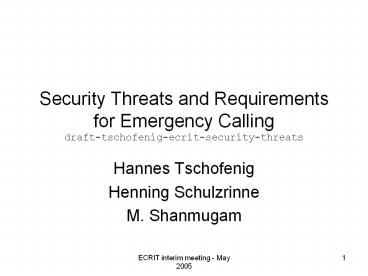Security Threats and Requirements for Emergency Calling draft-tschofenig-ecrit-security-threats - PowerPoint PPT Presentation
Title:
Security Threats and Requirements for Emergency Calling draft-tschofenig-ecrit-security-threats
Description:
Security Threats and Requirements for Emergency Calling draft-tschofenig-ecrit-security-threats Hannes Tschofenig Henning Schulzrinne M. Shanmugam – PowerPoint PPT presentation
Number of Views:107
Avg rating:3.0/5.0
Title: Security Threats and Requirements for Emergency Calling draft-tschofenig-ecrit-security-threats
1
Security Threats and Requirements for Emergency
Callingdraft-tschofenig-ecrit-security-threats
- Hannes Tschofenig
- Henning Schulzrinne
- M. Shanmugam
2
Terminology
- Internet Access Provider (IAP)
- Emergency call routing support routes calls
(e.g., SIP proxy) - Directory maps location to PSAP address
- Asserted location information somebody vouches
for this information
3
Framework
location provider (DHCP, )
A(V)SP
IAP
directory
configuration information
PSAP
4
Participant-visible threats
- Standard problems
- eavesdropping (privacy, interference with law
enforcement) - modification of call content
- preventing service to single user
(burglar-cutting-phone-wire) - Since no direct monetary gain, threat model
focuses on disruption of emergency service to
legitimate users - by causing infrastructure failure
- by tying up call takers
- by dispatching emergency responders
- Difference to most other systems
- PSAP doesnt care who you are as long as you
dont lie about the location or nature of the
emergency
5
Layers of defense(DOS, crank calls)
prevent or limit
detect filter
prosecute
6
Threats
- Denial-of-service (resource exhaustion) attacks
- entities affected
- directory
- call routing infrastructure
- PSAP
- resources
- network bandwidth
- processing
- human resources (call takers, first responders)
- Call identity spoofing
- primarily to elude DOS attack prosecution
7
Authentication
- Classical requirement must be able to place
call without authentication - Really?
- ? anonymity!
- Probably really want
- place call without being a paying customer of IAP
- thus, may still be known to service provider
- former customer
- third-party cert (e.g., some government
authority) - device cert (payphone on corner of Third and
Main)
8
Details security threat to one caller
- Confidentiality
- Modification to configuration information
- Modification of call information
- call signaling
- media
- PSAP impersonation
9
Details infrastructure threats
- denial-of-service attacks
- modification of configuration information
10
Caller identity spoofing
- ? authentication
- avoid delays during emergency call setups
- avoid multiple round-trip times
- define authentication independent of customer
relationships - e.g., might only need non-1918 IP address to
determine port and customer
11
Location spoofing
- End user provided location
- IAP provides assertion
- limited usefulness if wide coverage area
- Emergency call router inserts
- retrieved by V(A)SP from IAP
- must be based on some identifier
- IAP may sign
- Need to insert timestamp and identity
- prevent replay and copy-and-paste attacks
- identity may not be NAI
- IP address, MAC address
- primarily needed for traceability
12
Location spoofing threat mediation
prevent wide-area spoofing avoid global attacks avoid international jurisdictional issues
accountability reasonable chance that the person can be brought to justice future calls from the same person are considered suspect
prevent local-area spoofing attacker cant pretend to be in place X
prevent local-area collusion attacker cant get friend to give him location information for X
prevent local-area time cloning attacker cant pretend to be in X now if they were in X earlier
13
Impersonating a PSAP
- Assurance of reaching an authorized or legitimate
PSAP - Attacker may intercept directory request or call
routing request - ? Integrity-protect directory and signaling
interactions - Directory must be authoritative for information
- may be hard to prove
14
Open issues
- Mixture of threat description and requirements
- Should requirements be merged into general
requirements document (or remove security issues
from general requirements document)?































